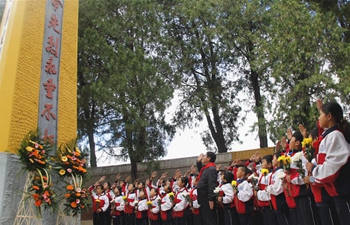ADDIS ABABA, Oct. 2 (Xinhua) -- African experts and policymakers on Tuesday called for data revolution so as to support the realizations of Africa's development ambitions.
They made the call during the Sixth Statistical Commission for Africa (StatCom-Africa-VI), which is underway in Ethiopia's capital Addis Ababa from Oct. 1 to 4.
Ethiopian President Mulatu Teshome said that quality statistical information was crucial, not only to provide basis for the design and implementation of policies at national, regional, continental and international levels, but also to monitor and evaluate their impacts on economic growth and social improvements.
"The data revolution promotes embracing technology and innovation at all levels of statistical processes such as collection, processing, analysis and dissemination," Teshome said.
Teshome further stressed that national statistical systems of African countries are facing an urgent need to reposition, adapt and strengthen their statistical production processes in order to meet growing needs of data users across the continent.
Noting the fact that most of the targets under the global Sustainable Development Goals agenda (SDGs) require adequate geo-spatial data, the Ethiopian president urged African countries "to focus on the use of technology in this new era of the data revolution to incorporate a geo-spatial data revolution in Africa."
Various other experts and policymakers - who have gathered under the four-day meeting hosted by the UN Economic Commission for Africa (ECA) - also stressed that Africa needs to start changing the way it produces and packages data and statistics to ensure its industrialization and diversification processes are backed by reliable and accurate data.
ECA Deputy Executive Secretary and Chief Economist, Abdalla Hamdok, emphasized the need for enhancing the capacity of national statistical systems in Africa to further align with the ever-growing demand for statistics in support of the national, regional and global development agendas.
"The role that national statistical agencies and their respective sectoral partners play in supporting the realization of the global sustainable development goals and the AU Agenda 2063 is paramount," Hamdok said.
Hamdok further reiterated the ECA's commitment to continue supporting statistical development across Africa to ensure the successful implementation of the sustainable development agenda.
South Africa's Statistician-General, Risenga Maluleke, also indicated the need for Africa to work together in building statistical capacity to support the continent's developmental aspirations.
Maluleke stressed that technology and lack of funding could hamper such aspiration.
UN Statistics Division Director, Stefan Schweinfest, in this regard, said that the continent needed data champions to advocate the importance of statistics for informed policymaking.
"We have to understand the sense of urgency. Having reliable, accurate and accessible data will help us meet the 2030 Agenda for sustainable development," Schweinfest said.
Schweinfest also reiterated the UN Statistics Division's commitment to working closely with the ECA and the African Development Bank (AfDB) to support member states in the 2020 round of population and housing census and to strengthen national statistical systems for the SDGs.
AfDB's Statistics Director, Charles Leyeka Lufumpa, also echoed Schweinfest's comments to working together as the African statistical community so as to realize the ever-increasing demand for data needed to track progress on the SDGs, and Africa's 50-year development plan, Agenda 2063.
"In this regard, our new efforts are geared towards enhancing advocacy about the importance and use of statistics, targeting mostly key policy makers. We believe that this will encourage governments to invest more in statistical development," said Lufumpa.
According to Lufumpa, the 2030 sustainable development agenda's call to leave no-one behind requires national statistical systems to invest in civil registration systems and to provide national indicators for monitoring and redressing inequalities as a matter of human rights.
"We will do all it takes to continue our support for building the requisite capacity in our countries to generate timely and reliable data to inform Africa's development process." Lufumpa said.













